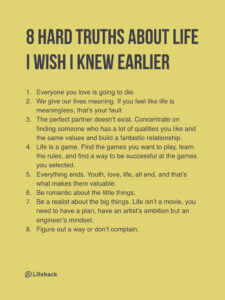
What’s the difference between a “Shortcut” and a “Hack”? It was not clear to me, so I decided to write this piece based on the image above that came from Lifehack.org.
I’ll take a stab at differentiating the two.
To me, a Hack is related to a soft skill and a shortcut is something I took when walking home from school by cutting through a couple of neighbor’s yards to get home faster.
There is no shortage of hacks/shortcuts and everybody loves a shortcut. Once you find and used a shortcut regularly, 80% of the time you don’t even realize that you are using it. Over time, a shortcut becomes your normal routine. There are plenty of resources dedicated to these hacks. Hacks are supposed to help with saving time or reducing a mundane task to quickly achieve a result. There are a bunch of keyboard shortcuts that I use on a regular bases, like ctrl c and ctrl v. (cut and paste).
What these hacks sometimes fail to do long-term is to help you understand the behavior or habit that put you in the situation to requires a hack in the first place. The hack gets you to the result faster or at the very least, guide you through the sticky spots. Think about the traffic App “Waze”. We often follow our iPhone direction apps blindly, without understanding the route, only the destination.
Bottom Line #1. While it’s fantastic to have these hacks at your fingertips and published by so many worthy writers and thought leaders, we don’t make the effort or take the time to understand our habits.
The things that we focus on and how we spend our time becomes our traits, our habits, and in some cases our identity. We’re often in such hurry to get to a result, we neglect the value of the activity itself.
Bottom Line # 2. According to the Pareto Principle, 20% of all activities produce 80% of all results. To put it another way: We spend 80% of our time on activities that do not contribute to value.
The website, https://goto.lifehack.org/start-here looks like an owner’s manual for every soft skill that you either can acquire or remind yourself that you forgot about. Their tagline sums it up. (“Lifehack – Help, Tips, and Guidance to improve all aspects of your life.”) I like that!
I found myself lingering over this list of questions to ask on “Date Night”. Not all 100 questions are to be asked on the same, mind you, just a few each week. The sex-related questions are surely the hook to get any reader to click on the hyperlink. The article even comes with instructions too.
I recently came across this Simon Sinek YouTube about how our addiction to technology is ruining our lives. I’ve decided to make some changes, especially on date night. Rather than pulling out my iPhone, I’ll pull out a couple of pieces of paper with these 100 questions and start a more meaningful conversation. If you don’t click any other link to this article, I encourage you to click the Simon Sinek video. It will either make a positive change in your iPhone usage or teach you to recognize whether or not the person you are talking to is actually engaged in a conversation you think you are having.
Here is a better view of the 8 Hard Truths I Wish I Learned Earlier.
You can get a detailed explanation of each of them at Lifehack.org.
- Everyone You Love is Going to Die
2. We Give Our Lives Meaning
3. The Perfect Partner Doesn’t Exist
4. Life Is A Game
5. Everything Ends
6. Be Romantic About The Little Things
7. Be A Realist About The Big Things
8. Figure Out A Way Or Don’t Complain
Bottom Line #3. Instead of heading to your FB, head to Lifehack and pick up a new skill or better yet, remind yourself of one that you forgot.
Comments are appreciated.
Passing this blog on to your friends would be a bonus for me.

